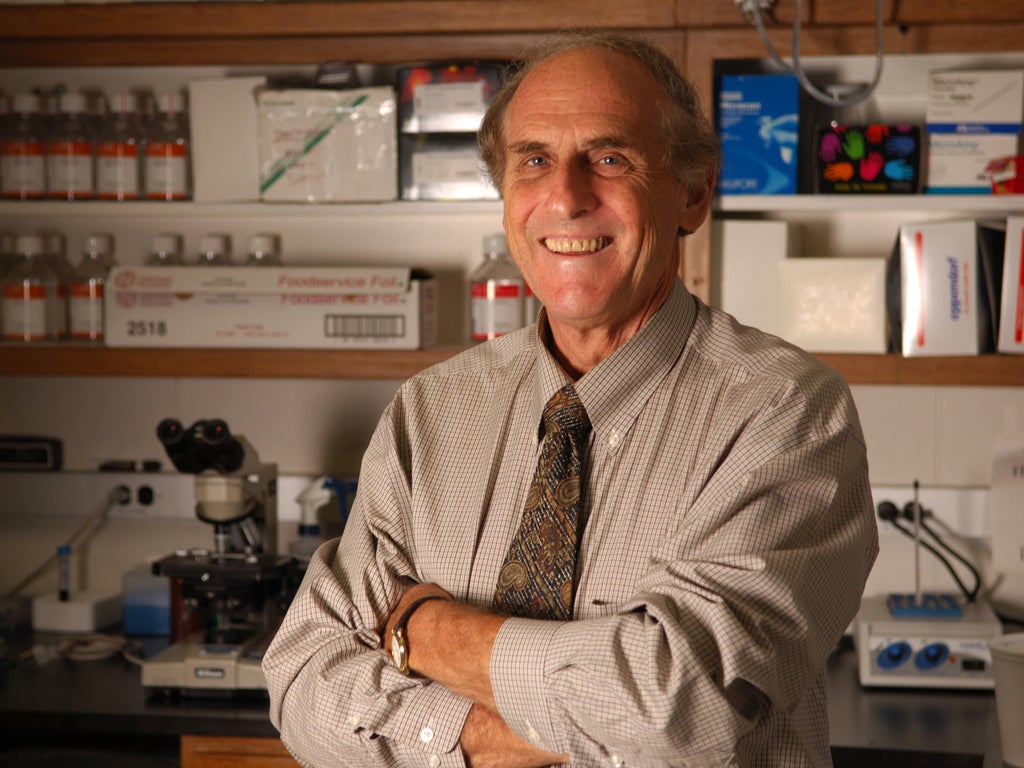Scientist died unaware that he was about to win a Nobel Prize
Award to stand despite rule stating it can't be given posthumously

Your support helps us to tell the story
From reproductive rights to climate change to Big Tech, The Independent is on the ground when the story is developing. Whether it's investigating the financials of Elon Musk's pro-Trump PAC or producing our latest documentary, 'The A Word', which shines a light on the American women fighting for reproductive rights, we know how important it is to parse out the facts from the messaging.
At such a critical moment in US history, we need reporters on the ground. Your donation allows us to keep sending journalists to speak to both sides of the story.
The Independent is trusted by Americans across the entire political spectrum. And unlike many other quality news outlets, we choose not to lock Americans out of our reporting and analysis with paywalls. We believe quality journalism should be available to everyone, paid for by those who can afford it.
Your support makes all the difference.One of the three scientists awarded this year's Nobel Prize in medicine died just four days ago – before the award was announced – unaware that he was about to receive the greatest accolade in science.
Ralph Steinman, a Canadian scientist at Rockefeller University in New York, shares the Nobel Prize with an American, Bruce Beutler, and Luxembourg-born Jules Hoffmann for their pioneering work into the immune system and how it defends the body against infectious diseases and cancer.
Doubts were raised over whether the prize could be awarded to Dr Steinman, as the rules state that the Nobel Prize cannot be given posthumously, although it is still possible to award the prize if the winner dies between the date of the announcement and the awards ceremony in December.
The board of the Nobel Foundation met yesterday to discuss whether to rescind Dr Steinman's award, but decided it would stand.
"The events that have occurred are unique and, to the best of our knowledge, are unprecedented in the history of the Nobel Prize," the foundation said in a statement. "According to the statutes of the Nobel Foundation, work produced by a person since deceased shall not be given an award. However, the statutes specify that if a person has been awarded a prize and has died before receiving it, the prize may be presented.
"An interpretation of the purpose of this rule leads to the conclusion that Ralph Steinman shall be awarded the 2011 Nobel Prize in Physiology or Medicine," the statement added.
Dr Steinman died on 30 September at the age of 68 after a four-year battle against pancreatic cancer using a form of immunotherapy based on his own discoveries.
His daughter, Alexis, said: "We are all so touched that our father's many years of hard work are being recognised with a Nobel Prize. He devoted his life to his work and his family and he would be truly honoured."
It was only after hearing about his Nobel Prize yesterday that the Rockefeller University learned of his death from his family, Marc Tessier-Lavigne, the university's president, said.
"The Rockefeller University is delighted that the foundation has recognised Ralph Steinman for his seminal discoveries... but the news is bittersweet," added Professor Tessier-Lavigne. "[His] research has laid the foundation for numerous discoveries in the critically important field of immunology and it has led to innovative new approaches in how we treat cancer, infectious diseases and disorders of the immune system."
In 1973, Dr Steinman discovered a new type of cell in the body called the dendritic cell, which plays a crucial role in activating the "killer" T-cells of the immune system that attack invading microbes. This is the crucial, later stage of "adaptive immunity" that allows the body to hold a memory of an attack and so build up immunity against subsequent attacks.
Dr Beutler and Dr Hoffmann worked on the first step, discovering the receptor proteins of the immune defences that recognise invading microbes and then activate the "innate immunity" that protects the body.
PRIZES THAT WON HEADLINES
* Many scientists have died before their discoveries were recognised with a Nobel Prize. One of the most celebrated examples is Rosalind Franklin of King's College London, who took the crucial X-ray images that led to the discovery of the DNA double helix by James Watson and Francis Crick at Cambridge. Maurice Wilkins, Franklin's colleague, shared the 1962 Nobel Prize in medicine or physiology with Watson and Crick but it is arguable whether he would have received it had Franklin lived – no more than three recipients can share one prize.
* Two Nobel laureates have declined the prize. Jean-Paul Sartre refused the 1964 literature prize because he declined all honours and Vietnamese diplomat Le Duc Tho turned down the 1973 peace prize, which he shared with Henry Kissinger, citing the situation in Vietnam as the reason.
* Four laureates have been forced to decline the Nobel Prize by political authorities. Adolf Hitler ordered three German laureates, Richard Kuhn, Adolf Butenandt and Gerhard Domagk, to turn it down, although they did later receive the award, but not the prize money. The Russian novelist Boris Pasternak initially accepted the 1958 literature prize but was later coerced by the Soviet authorities to decline it.
* Three Nobel laureates have been under house arrest at the time of the award – German pacifist and journalist Carl von Ossietzky, Burmese politician Aung San Suu Kyi and Chinese human rights activist Liu Xiaobo.
Steve Connor
Join our commenting forum
Join thought-provoking conversations, follow other Independent readers and see their replies
Comments